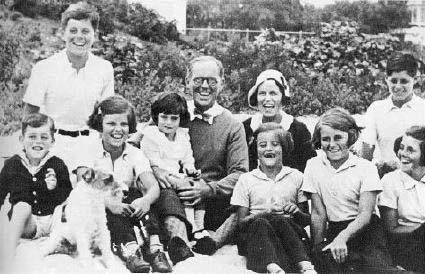
From his home in Hyannis Port, you can watch the sea, and on the horizon, the two islands of Martha’s Vineyard and Nantucket. I wonder if Ted happened to look at them and see, in those two names, Melville’s and the Kennedys’ America. At Martha’s Vineyard, the Kennedys, the great group of sons and nephews, used to spend their summers; from Nantucket, the Pequod used to leave with Ishmael aboard, looking for the white whale.
Edward Moore, or Ted, as everybody called him, was the last born of this seemingly infinite family. I met him several times, in the United States and in Rome. His rebellious white hair, his face that still, in the long last years of illness, maintained the Kennedy features, were familiar to everyone – everywhere in America and around the world. He was almost 20 years younger than John and less than 30 when his brother became president, and he inherited their political legacy: He was elected senator in Massachusetts, replacing JFK, and since then, never left that position in the Senate.
I guess it wasn’t easy to have the role of the puppy in the most powerful family in America, to live with the inheritance he tragically received after the shootings in Dallas and Los Angeles. Nevertheless, in this family legacy, marked by courage and death, he had a central role: He kept alive a political idea, without becoming a mere witness of the past, but instead, being able to initiate new and strong ideas. The old lion wasn’t asleep, as proved by his efforts to endorse, even when opposed by the democratic establishment, that young black man named Barack Obama.
Family. You just can’t speak of the Kennedys without talking about family, of the photos in Martha’s Vineyard with John on his sailing boat, with Bob out for a walk in the sand. Just saying the name of that island could get Nixon angry.
For American conservatives, it was a backwards mantra, just as in Italy when the left is tagged as radical-chic. And to disparage the Kennedys, because of that Bostonian ambiance (good studies, intellectual unrest, sentimental bond with the old Europe, venerable universities), Ted was frequently accused of (or insulted for) being a liberal. In Italy, we use other political insults, but there’s no big difference.
In the end, what was the essence of this Kennedy name, of these three brothers, of the power (or the suffered violence) of this family? I think it was that mixture of realism and passion for values and the capacity to deal with problems; that political sense that, in America, has inspired the best moments (beyond the fact that presidents were as blue or red as the colors of the parties) of political action; that sense, which, with my Italian eyes, I can see clearly in the years of Roosevelt’s presidency, in the brief and almost withering JFK presidency, and in the work of Robert Kennedy.
Ted projected this passion in difficult times, from the Nixon era, marked by the war in Vietnam, to the great liberal revolt of the Reagan era: maintaining the distant gaze that knew how to read events and news, without giving up on changing things, combined with that innate sense of fidelity to the great ideals of the American Constitution, that sense of national unity and patriotism, so distant from chauvinism.
Some looked at this old senator and, in general, at this family’s experience, with ill-concealed irony. Some spoke of an idealistic inspiration that degenerated in rhetoric. I don’t agree: In this situation and in this political concept, there were and still are dreams and ambitions and the capacity for leadership that can continue to teach a great deal to people who – on both sides of the Atlantic – want to define themselves as democrats.
I know that to the gattopardism [political opportunism] that still characterizes much of Italian political culture, the spirit of people who love challenges and are ready to pay the right price for it seems incomprehensible – that mixture of idealism and pragmatism, the sign of real democratic reform. I keep the bust of John that Ted give me, and I hope that Barack Obama, who spent his holidays as a president on Martha’s Vineyard, was able to say goodbye to him before his death, as he promised himself. The Kennedys, the family that still manages to remain united after the departures of mother Rose and last-born Edward, will live on, not only in history’s books, with the tragedies and the blood that marked their history, but also in the memory of every one of us: smart, brave, with an extraordinary sense of challenge and audacity; passionate and cultured.
When I wrote “The Broken Dream”, the book I dedicated to his brother, Robert (it was late 1993), I didn’t cite Whitman, but an Italian poet, Leopardi. And I want to use Leopardi’s words again in remembering Ted and his lessons: “Either imagination will be popular once again, and illusions will have bodies and substance in an energetic and mobile life, and life will return to being alive and not dead, and the greatness and beauty of things will be valuable again, and religion will regain its credit; or this world will become a harem of desperate people and, perhaps, a desert, as well.”

Leave a Reply
You must be logged in to post a comment.